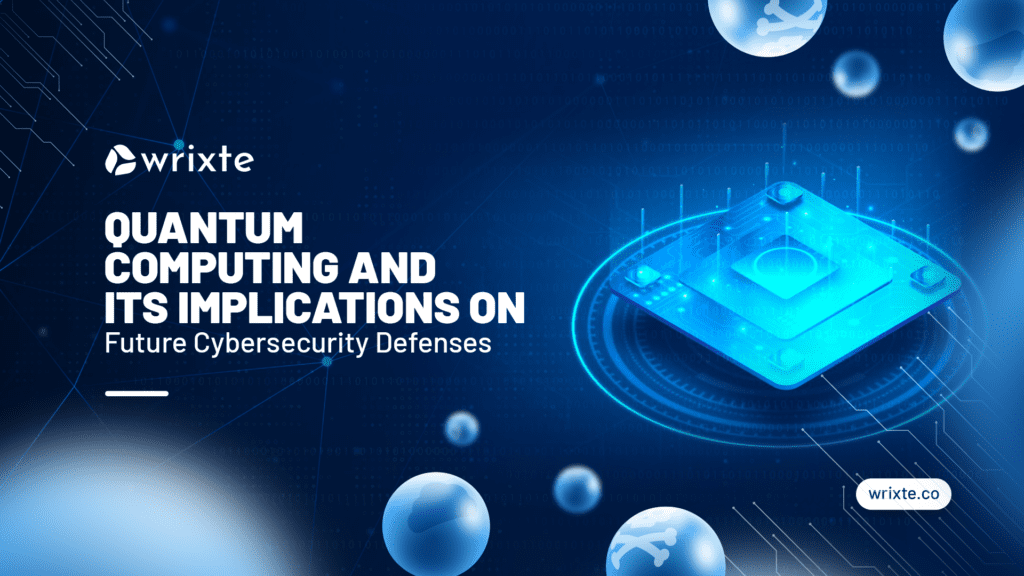The advent of quantum computing is poised to revolutionize numerous fields, from materials science to complex system optimization. However, its most profound impact may be on cybersecurity. The unparalleled computational power of quantum computers presents both an unprecedented opportunity and a formidable threat to current cybersecurity defenses. In this blog, we will look into the technical aspects of quantum computing and its implications for the future of cybersecurity.
The Quantum Computing Paradigm
Quantum computing leverages the principles of quantum mechanics, particularly superposition and entanglement, to perform computations at speeds unattainable by classical computers. While a classical bit represents data as either 0 or 1, a quantum bit (qubit) can exist simultaneously in multiple states due to superposition. Entanglement allows qubits that are entangled to be interconnected in such a way that the state of one qubit instantly influences the state of another, no matter the distance between them. This dual capability enables quantum computers to process vast amounts of data in parallel, exponentially increasing their computational power.
Implications for Cryptography
1. Breaking Classical Encryption:
Current encryption methods, such as RSA and ECC, rely on the computational difficulty of factoring large numbers or solving discrete logarithm problems. Shor’s algorithm, a quantum algorithm, can efficiently solve these problems, rendering classical encryption methods vulnerable. A sufficiently powerful quantum computer could break RSA-2048 encryption in mere seconds, posing a severe threat to data security worldwide.
2. Quantum-Resistant Algorithms:
In response to this threat, the field of post-quantum cryptography is developing algorithms that are resistant to quantum attacks. Lattice-based cryptography, hash-based signatures, and multivariate polynomial equations are among the promising approaches. These algorithms are designed to be secure against both classical and quantum computational attacks, ensuring long-term data security.
Enhancing Cybersecurity with Quantum Computing
1. Quantum Key Distribution (QKD):
QKD leverages the principles of quantum mechanics to create secure communication channels. Unlike classical key distribution, QKD uses quantum states to transmit keys. Any attempt to eavesdrop on the key exchange will disturb the quantum states, alerting the communicating parties to the presence of an intruder. This guarantees the security of the key distribution process, making QKD a cornerstone of quantum-enhanced cybersecurity.
2. Quantum Random Number Generation (QRNG):
Cryptographic systems depend on the generation of random numbers for keys, initialization vectors, and other security parameters. Classical random number generators (RNGs) are inherently deterministic and potentially predictable. QRNGs, however, exploit quantum mechanical phenomena to generate true randomness, ensuring the unpredictability and security of cryptographic keys.
Challenges and Solutions
1. Quantum-Safe Network Protocols:
Developing quantum-safe network protocols is crucial for integrating quantum technologies into existing infrastructure. These protocols must ensure compatibility with classical systems while providing enhanced security features. For example, hybrid encryption schemes that combine classical and quantum encryption can offer a transitional solution, providing security against both classical and quantum threats.
2. Quantum Computing Infrastructure:
The deployment of quantum computing resources requires a robust and secure infrastructure. This includes quantum data centers, secure quantum communication channels, and quantum-ready cybersecurity frameworks. Ensuring the integrity and security of this infrastructure is paramount to realizing the potential benefits of quantum computing while mitigating its risks.
The Future of Quantum Cybersecurity
1. Quantum Machine Learning (QML) for Threat Detection:
Quantum machine learning algorithms can analyze vast datasets and identify complex patterns indicative of cyber threats. By leveraging the parallel processing power of quantum computers, QML can enhance threat detection capabilities, enabling more accurate and timely responses to cyber incidents.
2. Quantum-Enhanced SIEM Systems:
Security Information and Event Management (SIEM) systems can benefit from quantum computing by accelerating data analysis and correlation. Quantum-enhanced SIEM systems can process and analyze security events in real-time, identifying potential threats with unprecedented speed and accuracy.
3. Quantum-Secure Blockchain:
Blockchain technology, used in various applications from cryptocurrencies to supply chain management, can be vulnerable to quantum attacks. Quantum-secure blockchain protocols are being developed to protect against these threats, ensuring the integrity and security of blockchain-based systems.
Conclusion
Quantum computing represents a double-edged sword for cybersecurity. While it poses significant risks by potentially rendering current encryption methods obsolete, it also offers powerful tools for enhancing security measures. The development of quantum-resistant cryptographic algorithms, quantum key distribution, and quantum random number generation are essential steps towards safeguarding data in a quantum future. Additionally, integrating quantum computing into cybersecurity frameworks, such as SIEM systems and threat detection algorithms, can provide unparalleled defense capabilities. As quantum computing continues to advance, staying ahead of its implications is critical for maintaining robust cybersecurity defenses.
By proactively embracing quantum technologies and developing quantum-resistant solutions, we can transform the potential threats into opportunities for building a more secure digital world.

